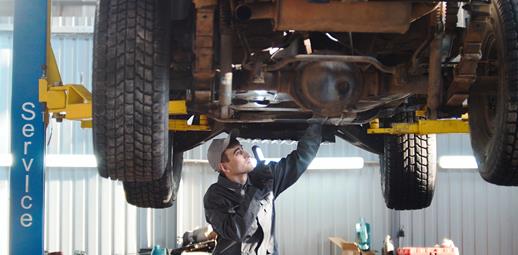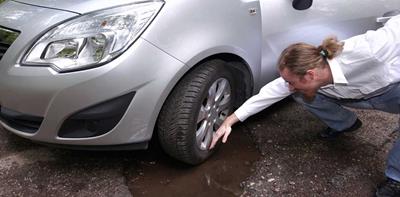
Keeping your car well maintained and in tip-top condition will help make sure it has a long life and runs efficiently, with as few expensive repair jobs as possible.
EASY AS HACK
Set reminders on your mobile for when your car service is due, so you remember to get booked in on time.
At a glance
|
How to keep your car in good condition
To do this you’ll need to:
- stay on top of the regular and easy car maintenance you can do yourself
- get your annual MOT - as required by law
- have your car serviced regularly.
What is a car service?
During a service a mechanic or technician will look at the parts of vehicle that wear out and need checking, replacing or topping up to keep it running smoothly and efficiently. They’ll also look to prevent future problems and can alert you about parts that will need to be replaced before the next service is due.
What’s included in a service depends on the garage you take your car to, the service that’s needed and the vehicle itself.
What are the different types and what’s included in a car service?
Not all aspects of a car need to be checked with the same frequency. So, there are different types of service [1] that check fewer or more things. Many services will include a vehicle road test to check how it’s handling.
Some major garage chains provide a list of checks they undertake online. Alternatively, you can simply ask the garage what the service will include when you book it.
Interim service
This is the smallest service, designed to be carried out after six months. It can be a good way of picking up potential faults before they become an issue. It’s typically aimed at high mileage drivers who may need more than one service a year.
What’s included: Broadly, an interim service will include a visual inspection of your vehicle, lights checked, engine oil and oil filter changes, as well as checks on some of your car’s fluid levels such as washer fluid, brake fluid and anti-freeze and steering fluid. Tyres and suspension will also be visually inspected.
Full service
This is usually the annual service and is the typical service for most cars. It typically is due once a year or after 12,000 miles. It suits the driver doing average mileage.
What’s included: A full service will usually cover everything included in the interim check, but goes further, with around 50 checks, including more time spent under the bonnet, and checking the brakes and other safety-related features. Additional checks may include things like your aircon and power steering fluids, your exhaust and fuel pipes.
Major service
This is a very comprehensive check that in addition to what’s covered in the annual service will also include parts that need checking and changing less frequently than annually. You’ll need one roughly every two years, depending on your mileage.
What’s included: As well as everything in the full service a major service may include replacement of brake fluid and cabin filters.
Manufacturer’s service
While manufacturers can no longer force you to have your service at a dealership to uphold your warranty, some people still prefer to have their vehicle serviced by the manufacturer if it’s still within warranty.
Owners of prestige or higher spec models might also want to get it serviced using manufacturer approved parts and according to the vehicle maintenance schedule set out by the manufacturer. This usually means you have to take it to the dealership that sold you the car. It has the advantage that mechanics specialise in this particular type of vehicle. But the downside is they can be more expensive. Some garages will offer services that guarantee original parts, equipment and service book stamps as standard to maintain the integrity of the warranty. This can also have the added advantage that often the service details are kept on a database and can be printed out for you whenever you want to sell the car.
What’s included: This will depend entirely on the manufacturer’s schedule based on mileage and time since the previous service but will be similar to the interim or full service and using any diagnostic tools available.
Electric car service
Electric cars have fewer components than their petrol and diesel counterparts and are therefore potentially cheaper and easier to maintain. They have few moving parts and don’t have fuel systems, spark plugs or exhausts so no checking required there. But they still need regular servicing to keep them running optimally.
What’s included: The battery, charging system, brakes and fluids are checked. Electric cars tend to be heavier, which means springs and dampers can wear out faster along with tyres.
What is the difference between an MOT and a service?
An MOT and a service are two different things, although drivers often choose to combine them in the same trip to the garage.
An MOT is a safety inspection to ensure roadworthiness – one that all cars over three years old must pass each year. You can’t drive your car legally without a valid MOT, without it your insurance is likely to be invalidated. An MOT doesn’t involve replacing any parts.
A service is like a health check, which looks to see what parts are wearing out and replacing them to keep your car running optimally. A service isn’t required by law.
Many people have their service and MOT done at the same time. This is because the service can pick up potential faults before the MOT is done to help make sure it is safe to pass. Some service providers may also offer discounts[2] if you get both done in the same visit.
How long does a car service take?
This depends on the type of service you choose. An interim service may take 1.5 hours, with a full service probably taking twice that time. You should always check with the garage, though, as this may differ. How soon you get your car back will also depend on how busy the garage is.
How often should you service your car?
Typically, manufacturers recommend a service every 12,000 miles or every year, whichever comes first for petrol and diesel vehicles. For electric cars it can be two years or 18,000 miles [3] . But check your car’s handbook to see what is recommended.
Some newer cars will give you a warning on your dashboard to tell you that your service is due. This can be based on the time elapsed since the last service, how often you drive and how far you drive.
If you have an older car your handbook will show you what’s recommended.
Your dashboard may also alert you if your car needs attention between services. So, it’s important to get to know your dashboard lights. Similarly, if your car starts making strange noises, it’s probably time to have it checked over – even if you are not due a service.
When buying a car second-hand, make sure you get the car’s service history and know the date of the last service, so you can work out when the next service is due.
How much does a car service cost?
According to the Office for National Statistics, the average household spends £369.20 a year on car servicing and repairs [4]. So, this covers more than the cost of the service.
Prices cited by some providers range from around £139 for an interim service to £195 [5] for a major service for a hatchback, but you may pay more or less depending on a range of factors such as:
- your vehicle
- the age of your car and what needs repairing or replacing
- your location
- the garage
- the type of service needed.
If you have an MOT at the same time, you’ll also need to pay for this.
It can pay to shop around, and don’t feel you have to automatically opt for your car manufacturer’s local dealership. It may be more expensive than an independent garage or a chain
Can’t I just service my car myself?
In theory, it’s possible to service your car yourself, but it’s not recommended unless you know exactly what you’re doing and have the right tools and equipment. So, for most people, a garage is the best option.
What you can certainly do yourself - even if you don’t have experience under the bonnet - is to keep your car regularly maintained between services, to keep it running as smoothly and safely as possible.
Why is my car’s service history important?
Keeping your service record up to date with a ‘full service history’ can help to increase the value of your vehicle when you decide to sell it. It shows the buyer that the car has been looked after.
So, it’s worth taking your vehicle logbook with you when you pick up your car after your service, to have it stamped. And keeping the bills and receipts that detail any work undertaken.
Find out more about Ageas car insurance
Article originally written: 15th August 2018, updated 22nd April 2025
Sources
[1] https://www.kwik-fit.com/servicing/packages/interim-and-full-service
https://www.halfords.com/car-servicing/advice/what-service-does-my-car-need.html
https://www.rac.co.uk/drive/advice/car-maintenance/how-often-should-i-service-my-car/
https://www.carwow.co.uk/guides/running/how-often-should-you-service-your-car
https://www.halfords.com/car-servicing/advice/car-servicing-whats-included.html
[2] https://www.halfords.com/car-servicing/help-and-advice
[3] https://www.rac.co.uk/drive/electric-cars/running/ev-maintenance-service-and-repairs-guide/
[5] What's the Difference Between a Full Service and an Interim Service? | FixMyCar


